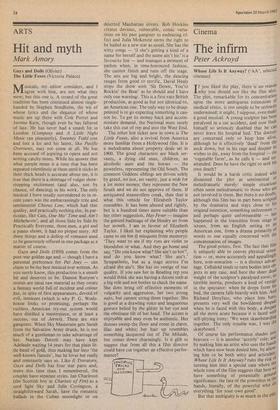ARTS
Hit and myth
Mark Amory
Guys and Dolls (Olivier) The Little Foxes (Victoria Palace)
musicals, my editor considers, and I agree with him, are not what they were; but this one is. A strand of the great tradition has been continued almost single- handed by Stephen Sondheim, the wit of whose lyrics and the elegance of whose music are up there with Cole Porter and Jerome Kern., though even he has faltered of late. He has never had a smash hit in London (Company and A Little Night Music ran pleasantly), Sweeney Todd cost and lost a lot and his latest, like Pacific Overtures, may not come at all. He has been accused of aspiring to opera and not writing catchy tunes. While his answer that what people mean is a tune that has been repeated relentlessly at them until it sticks in their thick heads is accurate about me, it is true that there is a shortage of vulgar show- stopping excitement (and also, not by chance, of dancing) in his work. The only musical I have totally surrendered to in re- cent years was the embarrassingly trite and sentimental Chorus Line, which had that quality, and practically nothing else. In par- ticular, like Cats, One Mo' Time and Ain't Misbehavin', and all those Side by Side by Practically Everyone, three men, a girl and a piano shows, it had no proper story. All these things and a dollop of romance used to be generously offered in one package as a matter of course.
Guys and Dolls (1950) comes from the post-war golden age and — though I have a personal preference for Pal Joey — can claim to be the best musical ever written. As you surely know, this production is a smash hit and deserves to be. Damon Runyon's stories are ideal raw material as they create a fantasy world full of incident and colour but, in spite of first appearances, devoid of evil, innocent (which is why P. G. Wode- house looks so promising; perhaps the ruthless American try-out system would have distilled a masterpiece, or at least a success, out of Jeeves). These are nice gangsters. When Sky Masterson gets Sarah from the Salvation Army drunk, he is too much of a gentleman to take advantage of her. Nathan Detroit may have kept Adelaide waiting 14 years for that plain lit- tle band of gold, thus making her into 'the well-known fiancée', but he loves her really and constantly says so. Like II Trovatore, Guys and Dolls has four star parts and, more this time than I remembered, the couples have separate styles. Ian Charleson (the Scottish boy in Chariots of Fire) as a cool light Sky and Julie Covington, a straightforward Sarah, have the romantic ballads in the Cuban moonlight or on deserted Manhattan streets. Bob Hoskins creates devious, vulnerable, comic varia- tions on his past gangster to endearing ef- fect and Julia McKenzie earns the right to be hailed as a new star as usual. She has the witty songs — 'if she's getting a kind of a name for herself and the name ain't his' is-a favourite line — and manages a moment of pathos when, in time-honoured fashion, she cannot finish and runs off the stage. The sets are big and bright, the dancing ranges from good to terrific, David Healy stops the show with 'Sit Down, You're Rockin' the Boat' as he should and I have only one warning: This is a first-rate British production, as good as but not identical to, an American one. The only way to be disap- pointed is to go expecting something it can- not be. To get its money back and accom- modate demand, the National must surely take this out of rep and into the West End.
The other hot ticket new in town is The Little Foxes, also a revival from America more familiar from a Hollywood film. It is a melodrama about property deals set in 1900. The good characters are black ser- vants, a dying old man, children, an alcoholic aunt and the horses — the powerless, representing the Old South. The common Giddens siblings are driven solely by greed, no lust, no vanity, just a wish for a lot more money; they represent the New South and we do not approve of them. If antiquated steamrollers creak, then that is what this vehicle for Elizabeth Taylor resembles. It has been abused and rightly, but is a hundred times more suitable than her other suggestion, Hay Fever — imagine the genteel badinage of the Henley set from her mouth. I am in favour of Elizabeth Taylor. I liked her explaining why people came to see her (I misquote from memory): `They want to see if my eyes are violet or bloodshot or what. And they go home and say, "Do you know what? She ain't so hot", and do you know what? She ain't.' Sympathetic, but as a stage actress I'm afraid she ain't. She has no vestige of star quality. If you saw her in Reading rep you would think she was having a decent stab at a big role and not bother to check the name. She does bring off effective moments of vulgarity and aggression, her two strong suits, but cannot string them together. She is good at a drawling voice and languorous gesture belied by the glitter in her eye and the obstinate tilt of her head. The accent is enjoyable and may even be authentic. Her dresses sweep the floor and come in claret, lilac and white; her hair up resembles something lacquered out of The Mikado, but comes down charmingly. Is it glib to suggest that from all this a film director could have cut together an effective perfor- mance?


































 Previous page
Previous page